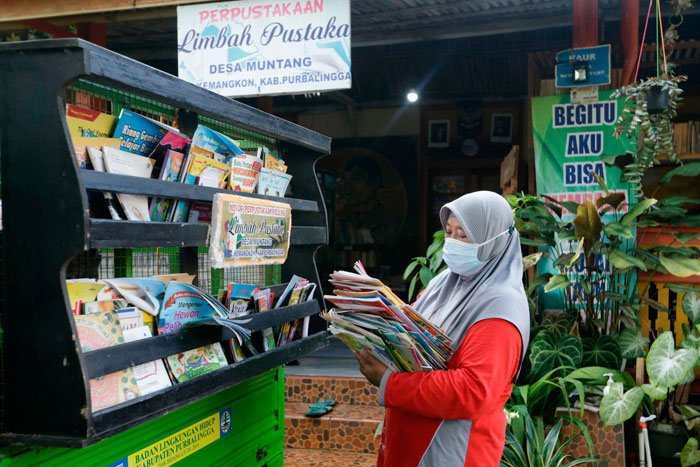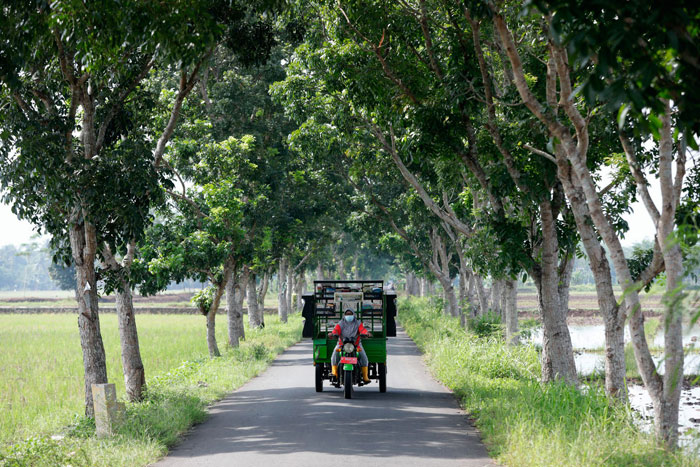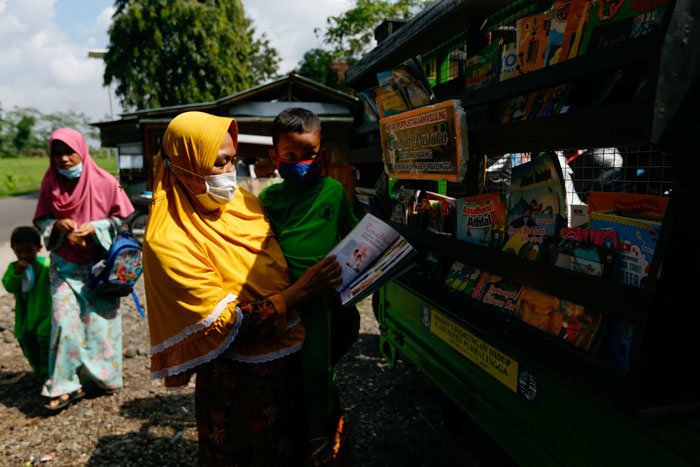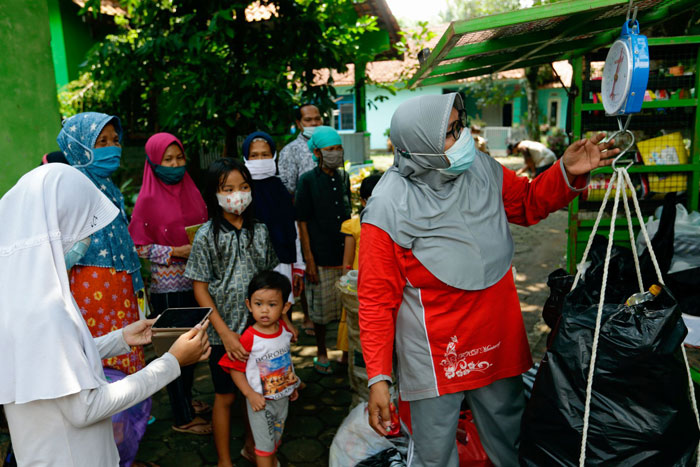閱讀環(huán)保兩不誤:印尼一圖書(shū)館推出“垃圾換書(shū)”服務(wù) Your trash for our books: Indonesian library creates literacy from litter
中國(guó)日?qǐng)?bào)網(wǎng) 2021-11-09 15:32

如果用親手撿的垃圾來(lái)?yè)Q書(shū)看,你愿意嗎?印尼的一名圖書(shū)館館長(zhǎng)近日在附近的村莊推出了“垃圾換書(shū)”借閱服務(wù),受到了孩子們的熱烈歡迎。

A librarian in Indonesia's Java island is lending books to children in exchange for trash they collect in a novel way to clean up the environment and get the kids to read more.
印尼爪哇島的一名圖書(shū)館館長(zhǎng)讓孩子們用收集的垃圾來(lái)?yè)Q取圖書(shū)借閱資格,這一新招既能清潔環(huán)境,也是為了讓孩子們多讀書(shū)。
Each weekday Raden Roro Hendarti rides her three wheeler with books stacked up at the back for children in Muntang village to exchange for plastic cups, bags and other waste that she carries back.
每個(gè)工作日,拉登·柔柔·亨達(dá)爾蒂都會(huì)騎著滿(mǎn)載兒童圖書(shū)的三輪車(chē)到滿(mǎn)堂村換取塑料杯、塑料袋和其他垃圾,然后再把一車(chē)?yán)鴰Щ亍?/p>

She told Reuters she is helping inculcate reading in the kids as well make them aware of the environment. As soon as she shows up, little children, many accompanied by their mothers, surround her "Trash Library" and clamour for the books.
她告訴路透社說(shuō),她在幫助培養(yǎng)孩子們的閱讀習(xí)慣和環(huán)保意識(shí)。她一出現(xiàn),小孩子們就把她的“垃圾圖書(shū)館”團(tuán)團(tuán)圍住,嚷嚷著要書(shū)。許多孩子都是在母親的陪同下來(lái)的。
They are all carrying trash bags and Raden's three-wheeler quickly fills up with them as the books fly out. She's happy the kids are going to spend less time on online games as a result.
孩子們都帶來(lái)了成袋的垃圾,拉登三輪車(chē)上的書(shū)被一搶而空后,很快就裝滿(mǎn)了垃圾。她很高興此舉可以讓孩子們少玩點(diǎn)電子游戲。

"Let us build a culture of literacy from young age to mitigate the harm of the online world," Raden said. "We should also take care of our waste in order to fight climate change and to save the earth from trash," Raden said.
拉登說(shuō):“讓孩子們從小培養(yǎng)文化素養(yǎng),可以減輕網(wǎng)絡(luò)世界帶來(lái)的危害。為了抗擊氣候變化、拯救地球,我們也應(yīng)該處理好垃圾。”
She collects about 100 kg of waste each week, which is then sorted out by her colleagues and sent for recycling or sold. She has a stock of 6,000 books to lend and wants to take the mobile service to neighbouring areas as well.
她每周能收集約100公斤垃圾,由她的同事對(duì)垃圾進(jìn)行分類(lèi)后將其回收或賣(mài)掉。她的館藏圖書(shū)共有6000本,她也愿意為鄰近地區(qū)提供移動(dòng)借閱服務(wù)。

Kevin Alamsyah, an avid 11-year-old reader, scours for waste lying in the village.
酷愛(ài)閱讀的11歲男孩凱文·阿蘭夏在村子里到處搜尋垃圾。
"When there is too much trash, our environment will become dirty and it's not healthy. That's why I look for trash to borrow a book," he says.
他說(shuō):“如果垃圾太多,我們的環(huán)境就會(huì)變臟,這樣不健康。這也是我撿垃圾換書(shū)的原因。”
The literacy rate for above-15-year-olds in Indonesia is around 96 percent, but a September report by the World Bank warned that the pandemic will leave more than 80% of 15-year-olds below the minimum reading proficiency level identified by the Organisation for Economic Cooperation and Development.
印尼15歲以上人群的識(shí)字率約為96%,但是世界銀行9月份發(fā)布的一份報(bào)告警告稱(chēng),新冠疫情將導(dǎo)致超80%的15歲人群閱讀能力低于經(jīng)濟(jì)合作與發(fā)展組織設(shè)定的最低水平。
英文來(lái)源:路透社
翻譯&編輯:丹妮

















 英語(yǔ)點(diǎn)津微信
英語(yǔ)點(diǎn)津微信 雙語(yǔ)小程序
雙語(yǔ)小程序